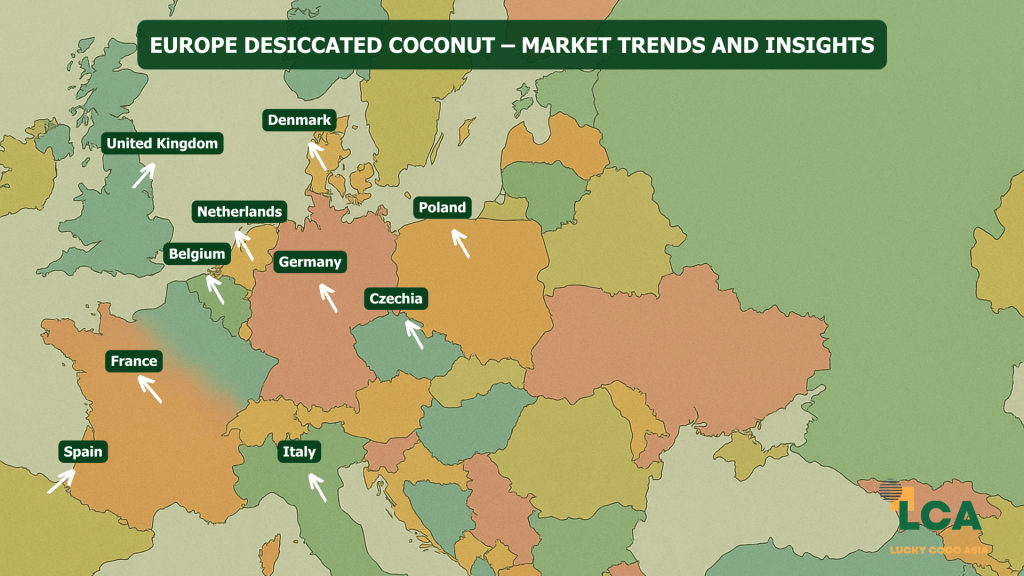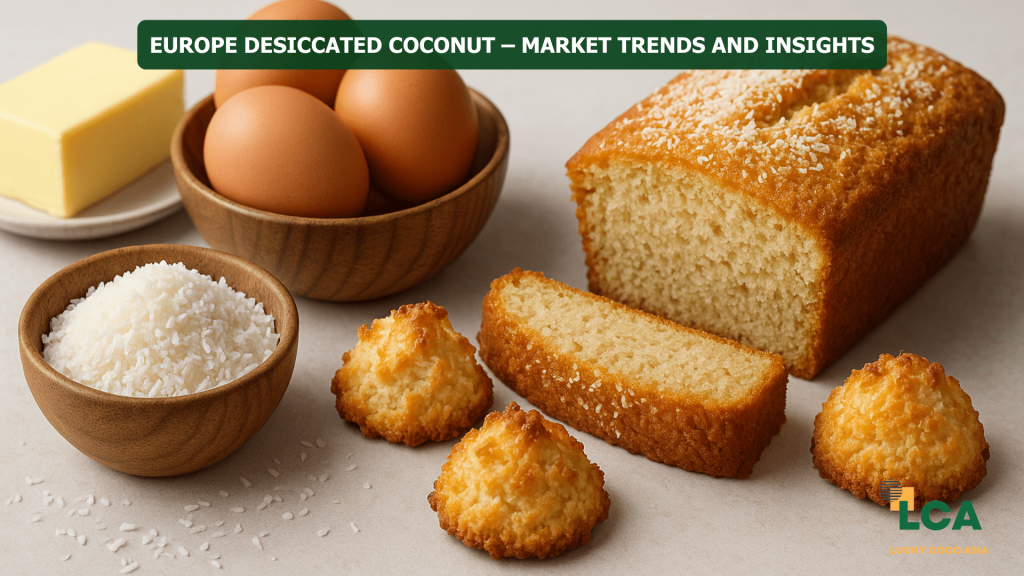Europe Desiccated Coconut – Market Trends and Insights

Europe desiccated coconut market has grown rapidly in recent years. This rise is driven by increasing demand for natural, healthy ingredients. The region, known for its strict quality standards and shifting consumer tastes, offers a valuable opportunity for desiccated coconut suppliers.
Growing Demand for Natural Ingredients – Europe Desiccated Coconut
Across Europe, consumers have become more mindful of their diets. The shift toward organic and natural ingredients has led to higher demand in Europe desiccated coconut. It’s now widely used in baking, snacks, cereals, and confectionery. According to LinkedIn Industry Insights, the market is expected to grow at a CAGR of 7.3% between 2026 and 2033.
Key European Market Trends
One major trend is the clean-label movement. Shoppers now look for foods with fewer ingredients and minimal processing. Desiccated coconut fits perfectly, offering a healthy alternative to processed sweeteners and additives.
Furthermore, ethical sourcing and sustainability influence buying decisions. Consumers prefer transparent and responsible suppliers. Those who demonstrate fair trade and traceability gain stronger market positioning. (Read also: 25kg Desiccated Coconut Bulk Supply – Ready to Export)

Market Dynamics by Country – Europe Desiccated Coconut
Each European country presents unique preferences and market dynamics that influence the demand for desiccated coconut. In Germany, for instance, consumers strongly prioritize organic and sustainably sourced foods. This has driven significant use of desiccated coconut in the bakery and snack sectors, especially among clean-label product lines.
Meanwhile, in the United Kingdom, there is a rapidly growing interest in vegan and gluten-free diets. As a result, desiccated coconut has emerged as a popular ingredient in health-conscious recipes, appreciated for its simplicity and natural appeal.
Moving to the Netherlands, the market is characterized by a strong import network for organic coconut products. Additionally, the country is known for its innovation in food development, where desiccated coconut is often incorporated into modern, plant-based formulations.
In France and Italy, the culinary approach leans toward artisanal and gourmet applications. Here, desiccated coconut finds its place in high-end bakeries and premium confectionery products, reflecting a consumer trend toward quality, authenticity, and natural ingredients. (Read also: Despite Price Surge, We Ensure Sustainable Desiccated Coconut Supply)
Altogether, these regional preferences create a diverse and evolving landscape across Europe, offering multiple pathways for desiccated coconut suppliers to position their products effectively.
Opportunities for Suppliers and Manufacturers – Europe Desiccated Coconut
Suppliers aiming to enter or expand within the European market can unlock growth by focusing on several strategic areas. First, obtaining organic certification remains a crucial differentiator, as it appeals to the region’s increasingly health-focused and environmentally conscious consumers. Moreover, by offering customized product grades—such as fine, medium, or extra-fine—suppliers can meet the specific needs of diverse sectors, including bakery, confectionery, and ready-to-eat snacks.
In addition to product flexibility, the adoption of eco-friendly packaging solutions adds significant value. Not only does it support sustainability initiatives, but it also strengthens brand image in markets where environmental responsibility is a top priority. Taken together, these strategic offerings can position suppliers as preferred partners in a competitive and quality-driven market.
Challenges in the European Market
Despite the growing demand, suppliers must also navigate several persistent challenges. For instance, strict regulatory requirements demand full compliance with food safety and labeling standards such as FSSC 22000, HACCP, and EU Organic certifications. Failing to meet these can hinder market entry and limit long-term success.
Furthermore, the market’s attractiveness has led to increased competition. Therefore, it becomes essential for suppliers to stand out by consistently delivering high-quality products, maintaining reliable lead times, and clearly communicating their sustainability efforts. By doing so, they can earn the trust of European buyers and establish long-term partnerships built on performance and integrity.
Strategic Market Entry Recommendations
To thrive in Europe’s coconut market:
- Promote verified quality certifications.
- Highlight sustainable sourcing and responsible practices.
- Be flexible with product offerings and responsive to client needs.
Conclusion and Outlook
The Europe desiccated coconut market offers real growth opportunities. Health trends, sustainability, and clean-label demands will keep driving consumer interest. Suppliers who commit to quality, ethical sourcing, and adaptability will be well-positioned.
With the right strategy, exporters can build long-term success in Europe’s vibrant food industry. (Contact us here)

